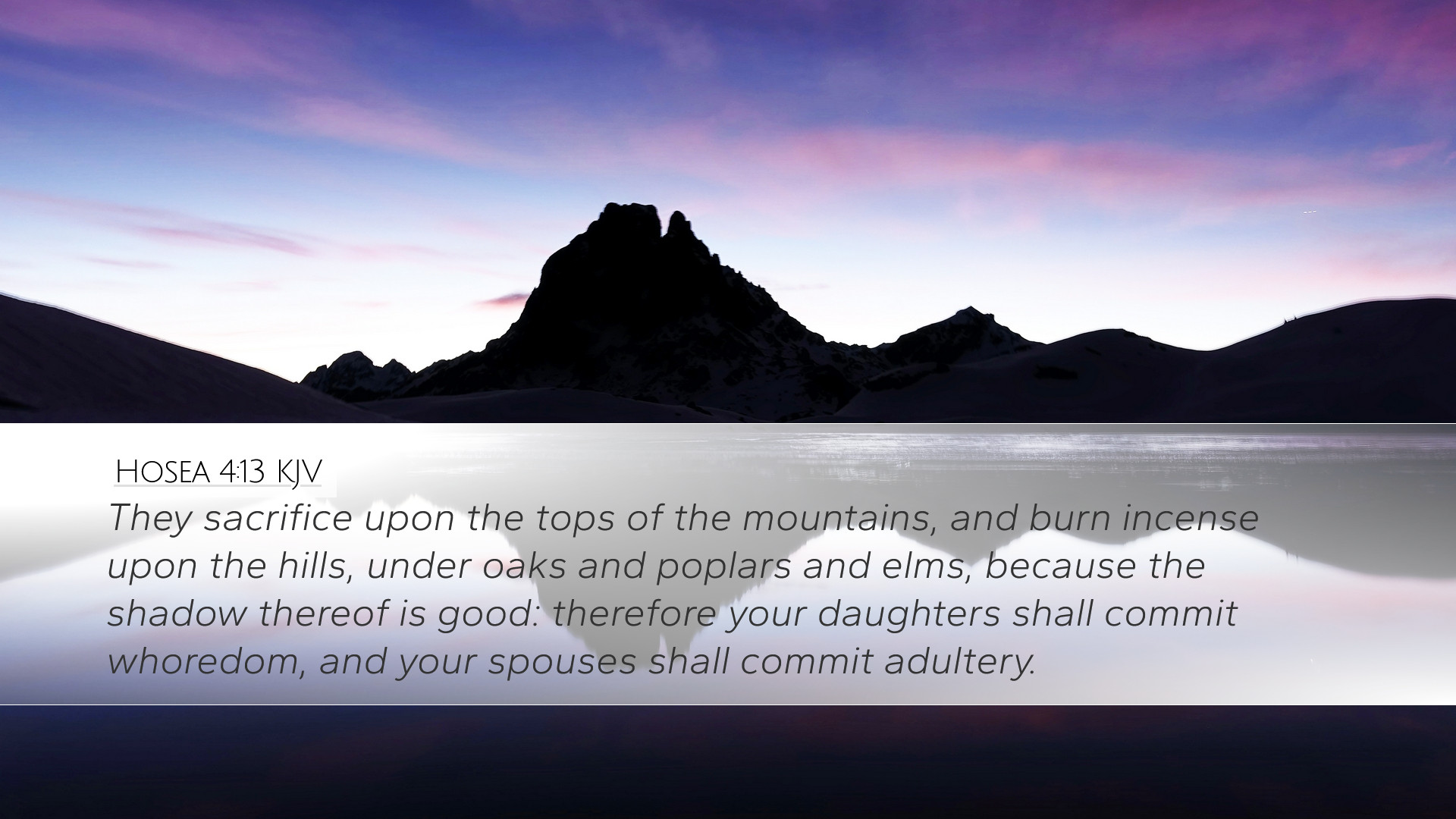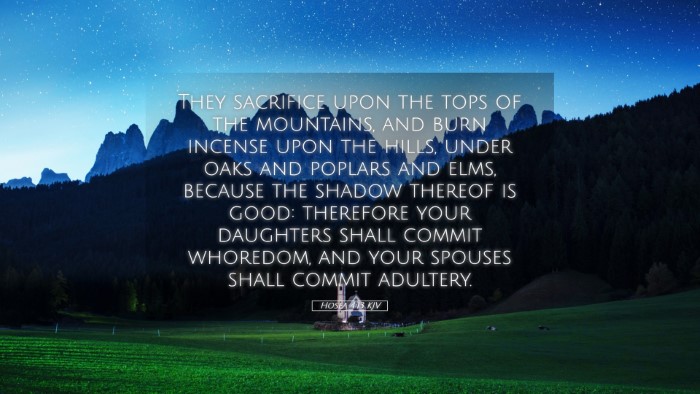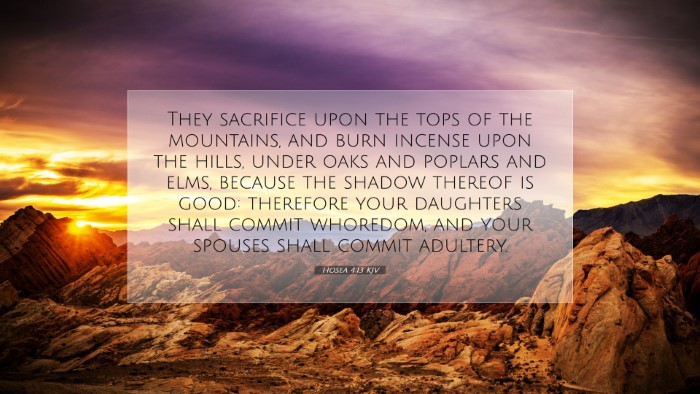Old Testament
Genesis Exodus Leviticus Numbers Deuteronomy Joshua Judges Ruth 1 Samuel 2 Samuel 1 Kings 2 Kings 1 Chronicles 2 Chronicles Ezra Nehemiah Esther Job Psalms Proverbs Ecclesiastes Song of Solomon Isaiah Jeremiah Lamentations Ezekiel Daniel Hosea Joel Amos Obadiah Jonah Micah Nahum Habakkuk Zephaniah Haggai Zechariah MalachiHosea 4:13
Hosea 4:13 KJV
They sacrifice upon the tops of the mountains, and burn incense upon the hills, under oaks and poplars and elms, because the shadow thereof is good: therefore your daughters shall commit whoredom, and your spouses shall commit adultery.
Hosea 4:13 Bible Commentary
Bible Commentary on Hosea 4:13
Hosea 4:13: "They sacrifice upon the tops of the mountains, and burn incense upon the hills, under oaks and poplars and elms, because the shadow thereof is good: therefore your daughters shall commit whoredom, and your spouses shall commit adultery."
Context and Background
The book of Hosea, written in the 8th century BC during the reign of Jeroboam II, addresses the spiritual state of Israel. Hosea’s prophetic message combines personal experience and national crisis. The verse reflects the themes of idolatry and immorality, emphasizing the consequences of turning away from God.
Exegesis of Hosea 4:13
In this verse, God speaks through Hosea to highlight the idolatrous practices prevalent among the Israelites. The mention of high places—“the tops of the mountains” and “the hills”—indicates the locations where the Israelites made their offerings, displaying their rebellion against God's commandments regarding true worship.
Key Themes:
- Idolatry: The Israelites had turned to worshipping Baal, engaging in sacrifices in places ordained for pagan worship.
- Corruption of Morality: The consequence of idolatry is evident; the verse foretells that moral decay will ensue, leading to sexual immorality.
- The Natural World: The reference to trees such as oaks and poplars signifies the natural elements the people revered and imputed divine attributes to.
Insights from Public Domain Commentaries
Matthew Henry's Commentary
Matthew Henry notes that “the high places were the seats of idolatry.” He explains that the people's preference for these locations demonstrated their desire for convenience in worship and their disregard for God’s established order. Henry emphasizes that their sacrifices were an abomination, equating their lust for false worship with the spiritual adultery toward God.
Albert Barnes' Notes on the Bible
Barnes elaborates on the use of “high places” which was a common feature in ancient worship, focusing on the ease of access over spiritual integrity. He indicates that the visibility and beauty of the high places were enticing, leading Israel to displace their genuine faith with this act of rebellion. Barnes correlates the idolatry with the eventual societal decay, linking the physical acts of sacrifice with the broader implications of divinely disapproved practices leading to moral degradation.
Adam Clarke's Commentary
Adam Clarke remarks on the phrase “the shadow thereof is good,” suggesting that the comfort provided by these natural elements was mistaken for divine approval. He asserts that the Israelites believed their idolatrous practices would bring them protection and blessing, reflecting a profound misunderstanding of God’s character and laws. Clarke underscores the gravity of associating these practices with divine sanction and warns of the destructive results that follow such actions.
Theological Implications
The sacrificial practices on high places represent a departure from God’s intended way of worship, illustrating a broader theological principle where proximity to God cannot be equated with the spiritual authenticity of worship. The decadence that follows idolatrous practices demonstrates a pivotal theme in Scripture: idolatry ultimately leads to moral and societal breakdown.
Application for Today’s Church
This verse can serve as a warning to the modern church against the allure of cultural and temporal influences that may lead to the compromise of biblical truth. Just as in Hosea’s time, the church must remain vigilant against practices that may seem benign or convenient but lead away from the holiness God desires.
Key Applications:
- Warn against Idolatry: Encourage congregations to identify contemporary idols that draw them away from true worship.
- Promote Spiritual Integrity: Foster an environment where genuine worship, based solely on Scripture, is prioritized over pragmatism.
- Address Moral Decay: Actively engage in discussions surrounding moral challenges that arise from cultural influences, ensuring that biblical truth is upheld.
Conclusion
The insights drawn from Hosea 4:13 challenge believers to reflect on their worship practices and societal engagement. By examining the historical and theological contexts, along with the rich commentary from established theologians, we are reminded of God’s call to true worship and the dangers of turning to the allure of false idols. This passage serves as both a historical lens and a contemporary admonition to return to holiness and fidelity in our relationship with God.


